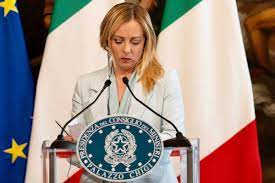Italy: Illegal migration drops 62% as Meloni’s policies take effect

Rome: Seaborne illegal migration into Italy has seen an unprecedented drop this year as the deterrent policies of Giorgia Meloni’s conservative government have begun to bear fruit, the local daily Il Giornale reported on Tuesday, August 13th.
According to newly published official data, Rome registered a shocking 62.4% drop in illegal arrivals in 2024, with 37,000 migrants landing in Italy as of August 12th compared to nearly 100,000 in the same period last year.
2023 was especially bad in terms of illegal arrivals with the Southern Italian island of Lampedusa being the hardest hit of all landing sites. Around 120 boats carrying between 6-7,000 migrants arrived on the island on a single day in September, prompting commentators and lawmakers alike to describe the event as an “invasion.”
While Italy celebrates, however, other Mediterranean countries are being targeted by the same people smugglers in much higher numbers than before—Spain registered a 155% increase this year, and Greece a whopping 222%—showing that the problem of illegal migration has not gone away but simply pivoted to more vulnerable shores.
Spain is particularly exposed to illegal arrivals in the Canary Islands which are located just 100 km off the coast of West Africa and which continue to experience a record number of landings year by year. Greece’s vast archipelago also provides easy targets for human smugglers from North Africa, but a significant portion of the boats carrying Middle Eastern migrants are opting for the closer Cyprus instead, a tiny nation struggling under the weight of this newfound crisis.

Meanwhile, Meloni’s Italy also excels in “assisted returns,” in which migrants who voluntarily choose to return to their home countries are given administrative, logistical, or financial support to help them re-integrate. To compare, Italy conducted over 9,000 assisted returns to Libya and Tunisia in only the first six months of this year, while the total number in 2023 toward all countries of origin stood at around 3,200.
Despite early criticisms of ineffectiveness, Italy’s strategy for addressing illegal migration appears to be working as intended. It is based on two components: deterrence and diplomacy, working in unison to solve the problem in the middle and long-term as well.
For deterrence, Meloni reformed the country’s immigration system to shorten the asylum procedure, introduce more thorough age verification protocols, ramp up voluntary and involuntary returns, allow longer detention times to prevent failed asylum seekers from disappearing, and eliminate several legal loopholes that allowed both migrants and search and rescue NGOs to easily abuse the system.
The most important factor, however, is said to be Italy’s off-shore asylum centers that are being built in Albania, just across the Adriatic Sea. Since those facilities are not located on EU soil, Italian officials can be even more effective in screening and deporting illegal migrants posing as refugees, who’ll have no chance of escaping the law and disappearing into other EU countries through the Schengen Area.
The project’s future role in deterring even more would-be illegal migrants is hard to overstate considering that it has not even been finished yet. Although the migrant reception centers in Albania were planned to be officially opened by August 1st, setbacks during construction caused months of delays, but Rome still promises that they will be operational before the end of this year. They will be capable of holding and processing up to 36,000 asylum seekers annually, which will be the majority of all sea arrivals if the current decreasing trend continues.
On the diplomatic front, Meloni’s strategy is to invest into key transit and origin countries throughout Africa which can help combat criminal organizations that facilitate human smuggling in exchange for structural funds that help contribute to their overall macroeconomic stability. After initial setbacks, the scheme now appears to be working well especially with Tunisia, which received Italian (and EU) money to develop its trade and energy infrastructure as well as to mitigate the effects of climate change.





